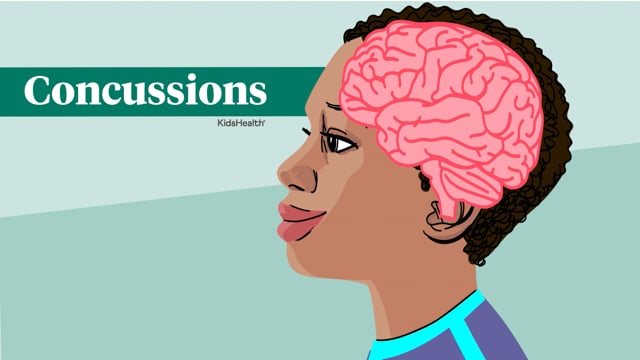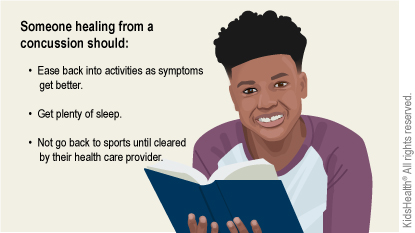- Parents Home
- Para Padres
- A to Z Dictionary
- Allergy Center
- Asthma
- Cancer
- Diabetes
- Diseases & Conditions
- Doctors & Hospitals
- Emotions & Behavior
- First Aid & Safety
- Flu (Influenza)
- Food Allergies
- General Health
- Growth & Development
- Heart Health & Conditions
- Homework Help Center
- Infections
- Newborn Care
- Nutrition & Fitness
- Play & Learn
- Pregnancy Center
- Preventing Premature Birth
- Q&A
- School & Family Life
- Sports Medicine
- Teens Home
- Para Adolescentes
- Asthma
- Be Your Best Self
- Body & Skin Care
- Cancer
- Diabetes
- Diseases & Conditions
- Drugs & Alcohol
- Flu (Influenza)
- Homework Help
- Infections
- Managing Your Weight
- Medical Care 101
- Mental Health
- Nutrition & Fitness
- Q&A
- Safety & First Aid
- School, Jobs, & Friends
- Sexual Health
- Sports Medicine
- Stress & Coping
Concussions
What Is a Concussion?
A concussion is a brain injury that leads to symptoms such as headache, dizziness, and confusion. Treating a concussion means rest and a slow return to school and regular activities. Symptoms usually go away within a few days to a month but sometimes last longer.

Concussions
What Are the Signs & Symptoms of a Concussion?
Symptoms of a concussion might happen right after the head injury or develop over hours to days. They can include:
- headache
- confusion
- dizziness
- vision changes
- nausea and/or vomiting
- trouble walking and talking
- not remembering the injury
- not remembering before or after the injury
- feeling sluggish
Someone with a concussion also might have focus or learning problems, sleep problems, anxiety, or sadness.
Concussions can follow being knocked out (losing consciousness) from a head injury, but they can happen without a person being knocked out.
What Happens in a Concussion?
A concussion happens when the brain is injured. This can happen when the head is hit — for example, from a fall. But concussions also can happen without a blow to the head — for example, in a car accident when the head snaps forcefully forward and back. The strong movement causes chemical and blood flow changes in the brain. These changes lead to concussion symptoms.
How Do Teens Get Concussions?
Most concussions in teens happen while playing sports. The risk is highest for cheerleaders and those who play football, ice hockey, lacrosse, soccer, and field hockey.
Concussions also can happen from car or bike accidents, a fight, a fall, or anything that leads to a head injury.
How Are Concussions Diagnosed?
If you have a head injury, stop playing sports or doing anything that could lead to another head injury right away and get checked by a health care provider (doctor, nurse practitioner, physician assistant, etc.).
To check for a concussion, the health care provider will:
- ask about how and when the head injury happened
- ask about symptoms
- test your memory and concentration
- do an exam and test your balance, coordination, and reflexes
Concussions do not show up on a CAT scan or MRI. Those tests might be done to look for other problems if someone:
- was knocked out
- keeps vomiting
- has a severe headache or a headache that gets worse
- was injured in a serious accident, such as from a car crash or very high fall
How Do I Recover From a Concussion?
Healing from a mild concussion involves a gradual return to activities that finds a balance between doing too much and too little.
For the first day or two, cut back on physical activities and those that take a lot of concentration (such as schoolwork). Just relax at home. You can sleep if you feel tired. (No need to have someone wake you up to check on you unless your health care provider told you to.) Calm activities such as talking to family and friends, reading, drawing, or playing a quiet game are OK. Avoid all screen time (including TVs, computers, and smartphones) for the first 2 days after the concussion. If symptoms get worse with an activity, take a break from it. You can try it again after a few minutes or longer, or try a less intense version of the activity.
Usually within a day or so, you can start to do more, except for sports and other activities that could lead to another concussion. Symptoms don't have to be completely gone for you to add activities. But if symptoms get worse when you do something, take a break from it. You can try again later that day or the next day, or try a less intense version of it.
Stay out of all sports and any activities that could lead to head injury (like rough play, or riding a bike or skateboard) until your symptoms are completely gone and you're cleared by a health care provider. It’s important to prevent another concussion because repeated concussions can have long-lasting, serious effects on the brain.
After a few days, you should feel well enough to return to school. Work with your parents, health care provider, and school staff to create a plan for your return. You may need to start with a shorter day or a lighter workload.
Don't drive until your health care provider says it’s OK.
Other things that can help:
- Avoid or cut down on screen time. Video games, texting, watching TV, and using social media are likely to cause symptoms or make them worse.
- Don’t drink alcohol or use drugs.
- Get plenty of sleep:
- Keep regular sleep and wake times.
- Avoid screen time or listening to loud music before bed.
- Avoid caffeine.
- For the first few days after the injury, if you have a headache, you can take acetaminophen (Tylenol or a store brand) or ibuprofen (Advil, Motrin, or a store brand). Follow the directions on the label for how much to take and how often.

When Should I Call the Doctor?
Call your health care provider if you:
- are not back in school by 5 days after the concussion
- aren't doing your usual level of schoolwork after being back to school for 2 weeks
- still need medicine for headaches a week or more after the injury
- have symptoms (such as headache, vomiting, confusion, or dizziness) that aren’t getting better or get worse
- still have symptoms 4 weeks after the concussion
- pass out
What Else Should I Know About Concussions?
Each person with a concussion heals at their own pace. It's good to add reasonable activities but also to know when your body and brain need more time to heal. Never try to “tough it out” if you have trouble with an activity. This can slow your recovery and could make the concussion symptoms worse.
Don't go back to sports until you're cleared to do so by your health care provider. Getting another head injury before your concussion heals can be very dangerous. If you do get another head injury, stop the sport or activity right away and tell a parent, coach, teacher, or trusted adult.
Getting one concussion can make someone more likely to get another. The symptoms can be different with each concussion. Repeated concussions may even lead to permanent brain changes. Not all concussions can be prevented, but you can take steps to make another one less likely.
Learn more about concussions online at:

© 1995- The Nemours Foundation. KidsHealth® is a registered trademark of The Nemours Foundation. All rights reserved.
Images sourced by The Nemours Foundation and Getty Images.